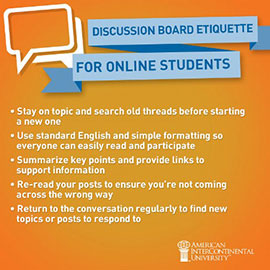Discussion Board Etiquette for Online Students

One of the most important facets of the online learning experience for college students is forums. Also known as discussion boards, forums are a place where online students and instructors meet and discuss course topics and related issues. Each discussion topic has its own dedicated area, known as a "thread." Each individual message in the thread is known as a "post." These discussions can be over in a few hours, or go on for weeks or months at a time.
For many students enrolled in an online college degree program, discussion board participation is a required activity and makes up an important part of their grade. Unlike in-person classroom discussions, where students can hide at the back of the lecture hall, forum discussions require input from every class member. Taking part in forums can enrich a student’s educational experience, allowing them to read the experiences of others and shape their own thinking.
Below is a quick review of proper etiquette for students participating in discussion boards.
- Stay On Topic
This is probably the most important single rule of forum discussions: stay on topic. If the thread is titled "State of Play in the Euro Crisis," don't post a message about last night’s baseball game, or something funny your cat did. - Search Old Threads Before Starting A New One
Sometimes, you may feel it’s time to start a new discussion thread. This is fine, but bear in mind that the topic you want to talk about may already have its own thread. Your forum should have a “search” box that lets you enter keywords to look for old threads. Use it. If you find a thread discussing what you want to talk about, you can then “bump” the thread back to the top of the forum by adding a new post with your thoughts about the topic to it. - Let Everyone Participate
When you’re passionate about a topic, or have a lot of prior experience in a field, it can be tempting to write exhaustively about it in your posts. Try to avoid this when possible by providing a summary of points and links to more information.
Also, don’t paste the same message in multiple threads, even if the post is relevant to multiple topics. Just post it once and then provide a link to it in other threads if you think it’s worth reading. - Use Standard English
One of the great advantages of message boards (and of online universities) is that they provide people from all over the world the opportunity to mix, mingle, and share perspectives. One of the disadvantages is that due to this diversity, not everyone’s grasp of English is exactly the same.
When writing posts on message boards, stick to simple, standard English words and punctuation—no slang or text-speak (course-specific jargon is fine). It helps your international classmates, as well as fellow countrymen who may not know your regional slang, to understand what you’re talking about. - Provide Links To Support Facts
Since the primary purpose of your being on this message board is educational, be ready to link to resources when you quote facts or research in your posts. These links can point either to resources in your college’s virtual library or to resources elsewhere on the Internet. Try to ensure that your outside sources are reputable and authoritative. - Use a Simple Format
Online students do a lot of reading, and spend a lot of eye-wearying time in front of screens. Don’t add to your classmates’ future optometrist bills by using a lot of fancy formatting. Crazy fonts, smileys, unusual text colors, anything animated: these should be probably be avoided in an educational forum. - Don’t Get Personal, Don’t Take Things Personally
Because you can’t read someone’s body language or hear their voice when you read their words during a forum debate, it’s possible to assume they are being insulting, or that you’ve offended them. Unless they’re being blatantly abusive, always give people the benefit of the doubt. And re-read your own posts before you submit them, to make sure you aren’t coming across the wrong way.
Second, educational forums really aren’t the place for talking about your personal life. Relating a professional anecdote that’s relevant to your thread subject is fine, but if you want to talk to others about your day-to-day life, exchange contact information and e-mail them directly. After all, making friends is one potential benefit of online learning, too. - Learn Your School’s Discussion Board Policy
Each online school has its own policy and intricacies around discussion board usage. Be sure to review your school’s catalog or student handbook to learn any specific rules for posting. This could include how often one is expected to create or respond to posts, or deadlines to which you must adhere. - Return to the Conversation Regularly
Since the discussion occurs over time there will often times be new topics or things to respond to if you check back later in the week, so don’t try to complete all of your posts as quickly as possible or you’ll miss a significant part of the conversation. - Provide Detail When Responding to Other Student Posts to Drive the Conversation.
Offer alternative examples, viewpoints, or concepts. Comment on a specific part of their post with what you liked about it and why. Follow up with open-ended questions to encourage others to jump in on the conversation.